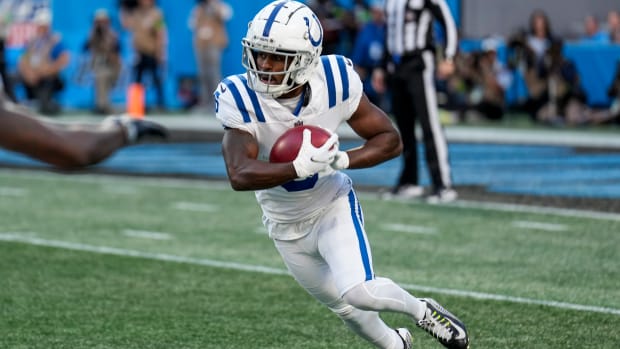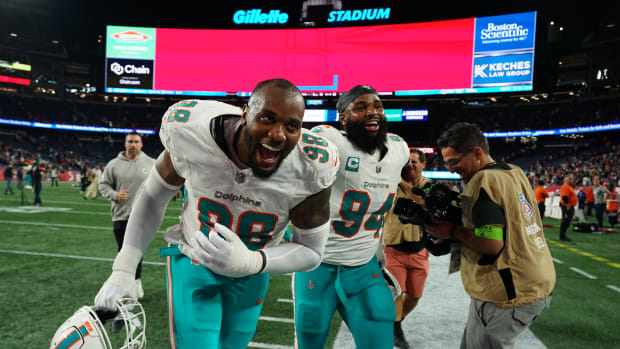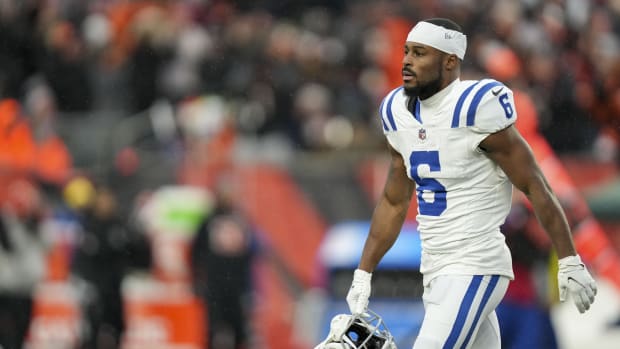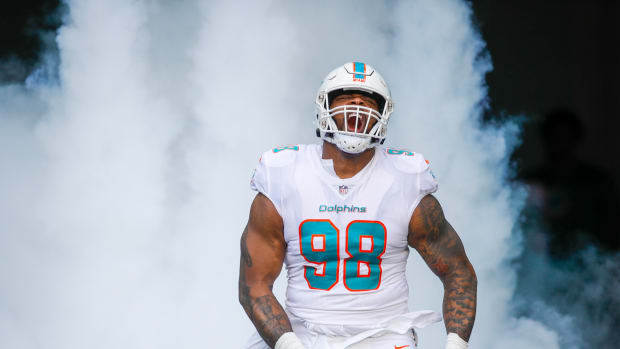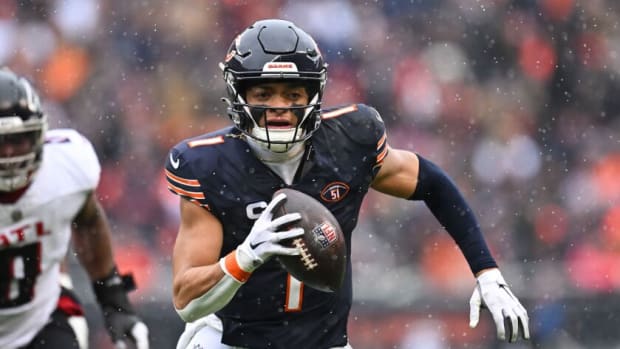Full Transcript of Indianapolis Colts GM Chris Ballard’s Commentary on Racism in Society
INDIANAPOLIS — Here’s the full transcript of Indianapolis Colts general manager Chris Ballard’s Thursday statement in a Zoom video conference call about racism in society.
“Look: I'm not here … to talk about football. And I don't have a prepared statement — I've got some notes — but I'm just gonna talk about how we're feeling, how I'm feeling, kind of what I've experienced here over the past 10 days, watching what's going on in our country, then watched what happened, you know, the last two days, which, look: I've been this league 20 years, and (it) might've been as impactful a two days that I've ever been a part of. And I'm proud of the leadership that we have in terms of (head coach) Frank Reich, what he stands for, the man — he stands for everything right. And to watch him lead right now makes me very proud.
“To watch our players speak with what's on their hearts and on their minds; makes me very proud. To watch (director of player engagement) David Thornton, one of the unsung heroes of our organization, lead the charge for change. He's a special human being, he's a special person; I consider him a close friend, and just lucky to have him around and on our team. Feel very fortunate.
“But I can't sit here and remain silent, because that's exactly what we've done — every time our black community screams and yells for help … we have to end social injustices and racial inequalities. We have to end the police violence against our black communities. You know, black lives matter. I don't understand why that's so freakin' hard for the white community to say. Black lives matter.
I've been ignorant. I've been ignorant to the real problem. And I'm ashamed of that. I just came to the realization here over the last 10 days with some really hard, difficult conversations that we've had as an organization, as a team, with my family, with my sons, and I've been ignorant to the real problem.
“See, this is not a black problem. This is a white problem. This is an issue that we have to talk about, and we can't sugarcoat it. We can't sugarcoat our way out of this, we can't go back into our bubble, 'cause that's what we've always done; we've always gone right back into our bubble. And we've never really listened. We haven't listened — I haven't listened. We haven't listened as a country. White America refuses to listen. We want to keep things the same, and it can't, or we'll continue down the same paths we're continuing down. And that has to change — and nothing will change until we do that.
“I'm ashamed of that. I'm embarrassed by that. I pride myself on connecting and really getting to know people and caring for 'em. And, look: don't get me wrong — my wife and I teach love and respect; everybody, no matter what their race, you know, whatever their religion is, whatever their sexual (preference), it doesn't matter. We teach them to respect and love. But we didn't teach them, you know, really what they need (to know) — it's gotta be more than that. It's gotta be more than that. And I had long talks with our kids, especially my son, you know, here over the last week — my wife's out of town with the girls right now — so my sons, it's just been us in the house, (and talked) about what's going on in our country. And they have no idea. That's my fault. That's my fault as a father. You know, it starts when they're young; it starts in their families. Kids are not born to hate; they're not. They don't have any clue about race; they're taught it. They're taught it at home.
“And when I hear stories — it breaks my heart — like, the last two days, listening to our players talk — listen to our coaches talk. What kind of place do we live in where they feel uncomfortable buying a car and afraid that they're gonna be racially profiled because of what they're driving? What kind of country and place do we live in where a black man and his family go into a restaurant and they get second looks? It's not a good place.
“I was ignorant to the fact — I knew it — but I was ignorant to the fact it was happening. And shame on me. That won't happen again. We're gonna stand up for what's right. We're gonna stand up for what's right as an organization. People deserve it. This is about humanity. This is about human lives we're talking about here. You've gotta have some empathy for the human life. We're all the same. Like, I was naive to this; like, very naive, 'cause I think, 'Well, OK, I don't see color.' But I'm naive to think that everybody else is the same way. And then there's little things that I did that I didn't realize that was hurting other people.
“You know, we've had some great talks. You know, when I got to listen to a close friend that I've worked with for a long time tell me — and I talked to him and his wife last night — you know, tell me that the things they've had to deal with over time. And for me to not be empathic for that is just flat wrong. You know, explaining to my kids — they didn't understand the protest and the violence. I explained to them, look: people are trying to peacefully protest, but they're screaming and yelling for help. Like, I didn't agree with the violence, but I understood it; like, I understood the violence. They're screaming for help. They want help. Look at the signs: 'I can't breathe,' 'Stop killing black people.' They're screaming for help, and it's our job to help. If you've got any decency in you, you've gotta want to help.
“And that's our duty. That's what this country's about; that's what this country was built upon. How do we, and I'm gonna read, 'cause it says — look, this is in our (Declaration of Independence): 'We hold these truths to be self-evident, that all men are created equal, that they are endowed by their creator with certain unalienable rights, that among these are life, liberty and the pursuit of happiness.' Well, that ain't happening right now. That's not happening. We can sit here and say, 'Oh, yes it (is);' No, it's not. It's not.
“How does the black community — and this is how I kind of explained my son the other day — how does the black community feel when they see George Floyd with a knee on his throat and dying because of it? Then, to have three people watch it — three other people watch it — and not do anything. That's what we're doing right now as a country. We're watching it, and we're not doing anything about it. That makes me sad. To have a fear that every time, you live every day, you come into contact with a police officer — when a black American comes into contact with a police officer and they're scared, and they're fearful of what can happen, that is wrong. That is dead wrong.
“This is how I put it to my son the other day: I said, 'OK, close your eyes, and I want you to think about this: a police officer's got a man, got his knee on him, he's choking him, he's sucking all the air out of him, and I want you to think that's your father, who's white. Think about what your reaction would be, and think about seeing that over and over again. What would your reaction be? You'd be angry. You'd be hurt.’
“I wanna thank all our players. All of 'em — every single freakin' one of them. They brought it to light. And, look, I thought Jacoby Brissett put it best when he said, 'You're either part of the solution or you're part of the problem.' And for us to sit here and remain silent — you're part of the problem.
“I want to do my part. I know we can't fix this overnight. I know it's gonna take time. But I want to do my part. My family will do our part. You can bet on that. I know you're gonna have questions, and that's good, 'cause I'm here to answer (them) — no football. This ain't about football right now. Football will come and that'll play itself out and we'll have a good season; we've got a good football team. We're here to talk about life right now and the problems we have in this country. So I'll take any question you got.”
Frank Reich said the other day he would never try to restrict a player's individual expression, and it's not completely fair to you to ask you talk about the entire NFL, but do you feel that the NFL in the past has restricted that for some players, specifically with Colin Kaepernick kneeling and everything like that?
“I'll say it this way: like everybody, we didn't listen. I didn't listen in '17. You know, I didn't listen to (former Colts cornerback) Darius (Butler) — I love Darius Butler. I love Darius Butler. He tried to explain it. I thought I heard it; I didn't hear it. We didn't listen. We didn't listen.”
You hit on this, but what did you learn the last two days in those meetings that you didn't know before those meetings?
“We have guys hurting. Really hurting. That makes me sad, man. I mean, they're hurting. And I didn't see it. See: Don Patterson, who I'm close with an have known for years in Kansas City and does some work for us, Don Patterson made a great point — it's one of the things I love about football: like, the locker room is really a special place, man. It doesn't matter your color, your religion — it doesn't matter. They've gotta come together and come together as a team, and it doesn't matter what your color, your race; it's one of the great fair places — it might be one of the last pure fair places we have. And Don made this statement, because we all talked about it, and Don made this statement of, well, you all talk about how special the locker room is. Why can't we take the locker room to the world? Well, absolutely.
“It's one of the great things about this game. And easier said than done, but he's right. If everybody in America could experience what our kids do in that locker room, they would understand better, because they all come together. But here's the problem: when our black players walk out of the locker room, it changes. Their mindsets change, because now they're in protection mode. And a lot of them said: they're numb. They've become numb to the looks, they've become numb to when they walk on an elevator and somebody moves the other way just because of the color of their skin. They've become numb when they go to a restaurant and people give them a double look. They become numb to that. That's a shame — that sucks, man. That freakin' sucks. That sucks.”
Obviously your words have been really powerful. What actions do you want to see your team take here in the coming days, months?
“I'm glad you asked that. So David (Thornton) — and David did this before any of this — so he reached out to the (NFL) Players Coalition, which was created by Anquan Boldin and Malcolm Jenkins in combination with working with the league, and I was really impressed by their approach and what they want to do. We're gonna work with them. I was blown away listening to them yesterday, but they've got a great approach to the structural changes to a variety of problems that plague the black community, including criminal justice reform, police and community relations. And we're really looking forward to drawing upon their expertise and guidance on these critical issues. They're gonna work with us, and we're gonna work with them. And I encourage the entire league to reach out and use them, because they're outstanding, and they stand for the right things. I mean, I listened to Anquan Boldin talk and his group of experts, and was blown away by the work they had put in and the things that they're doing. You know, change will not be easy, and it's gonna take all of us, and it's gonna take all the working together to create the change. And it's not gonna happen overnight; it's gonna take us, you know, the power to vote to really dig in on the issues and to know who we're voting for and do they stand for the right things. Do they stand for the right things? Like, there's things brought up that I had no idea; man, I just felt stupid for not having an idea about what was going on.”
With the NFL now, there's clearly a lack of minority coaches, minority executives, in the NFL right now, and that's obviously something I think would help with the problem. I was wondering: Are there things you think the NFL can do, and the Colts specifically can do, to address that issue?
“Well, look, let me say this: (Colts owner) Jim Irsay's outstanding. He stands for all the right things, too. And, look: I think we've gotta continue to put people in position to succeed. Jim Irsay has a great history, and he didn't hire these men because they were African-American and black; he hired them because they were great coaches, great leaders. Tony Dungy — I mean, this guy's in the Hall of Fame. You freakin' kidding me? Jim Caldwell. I mean, these guys are great coaches. So I think we continue to develop, and we've got some young coaches on our staff that I think are really good that can develop. But there's no doubt: we need to do more as a league. We need to continue to develop and get guys in position where they can succeed.”
You mentioned that in 2017 you did not completely understand the whole Kaepernick thing. If your players were to kneel this coming year, would you look upon that any differently than you might have previously? Or what would your general view of that be?
“Well, whatever our team ends up doing, we're gonna support. But we're gonna do it together as a team. That's what we're gonna do: we're gonna support 'em, and we're gonna do it together as a team. We've said that all along. So whatever we decide to do, we're gonna do it as a team. That's the beauty of that locker room: we're gonna do it as a team. I understand why people took a knee. I don't know I didn't completely understand it the first time, but damn right I do now.”
(Phillip B. Wilson has covered the Indianapolis Colts for more than two decades and authored the 2013 book 100 Things Colts Fans Should Know & Do Before They Die. He’s on Twitter @pwilson24, on Facebook at @allcoltswithphilb and @100thingscoltsfans, and his email is phillipbwilson24@yahoo.com.)
